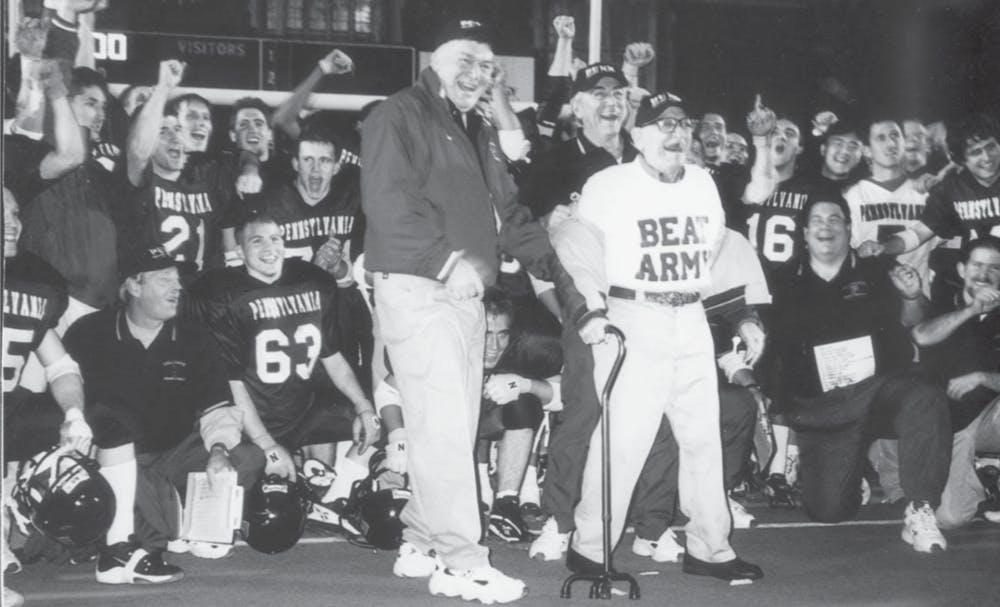In the fall, Saturday afternoons at Franklin field belong to Penn football. On Fridays, a different football team takes the field at the historic venue. Penn sprint football has been a Franklin Field staple since the team's inaugural season in 1931.
The popularization of lightweight football, now called sprint football, was born out of a 1930s movement spearheaded by then Penn President Dr. Thomas Sovereign Gates, which he described as “Football for All." Just one portion of his attempt to overhaul the increasingly professionalized nature of collegiate athletics known as the Gates Plan, he sought to expand what had begun with a few one-off games between Harvard and Yale 150 pound players into a recognized sport: sprint football.
The 1931 season, considered to be a trial by the University, saw the Quakers play four games, including a matchup against Yale that would be the first sprint football game played at Franklin Field. While the crowd of approximately 2,000 was a far cry from the 70,000 who would come to see Penn’s varsity football team play, they were treated to a 7-0 victory over the Elis. After defeating Princeton in the first football matchup of any type between the rivals in nearly 50 years, the Quakers would claim the first ever, albeit unofficial, 150-pound Championship.
The next major step for the program would come in 1934, when Penn became one of the charter members of the Intercollegiate 150-Pound Football League alongside Yale, Rutgers, Lafayette and Princeton. Known today as the Collegiate Sprint Football League, Penn is the only charter member that still fields a team. The Quakers would participate in the league's inaugural game traveling to Princeton's Palmer field, claiming a 19-6 victory.
As the team continued to grow in popularity, the program still had some challenges making a permanent home at Penn. While the team did play the majority of their home games at Franklin Field, a combination of weather, field conditions and scheduling conflicts forced the team to play a number of important games at Murphy Field, the current location of Meiklejohn Stadium, or River Field, which is in downtown Philadelphia. One such occasion saw the 1940 team celebrate the University's bicentennial by claiming the league title at River Field.

Photo courtesy of Penn Athletic Communications
Before 1970, constant change in the league structure and rules, as well changes in head coach staffing, threatened the stability of Penn sprint football. However, Penn solved some of these issues in 1970 with the hiring of coach Bill Wagner. Wagner is currently preparing for his 50th season at the helm of the sprint football team, and as he has blossomed into a University legend, the sprint football program has established itself as a mainstay within Penn athletics.
One of the most important developments of the Wagner era has been the movement of home games to Friday nights to allow the team to play every home game at Franklin Field.
RELATED:
125 years of Franklin Field: The home of Penn football
Meet the 33 newcomers introduced as Penn football's 2019 recruiting class
“Playing all of our games on Friday nights has made it really special for us,” Wagner said. “When they decided to get rid of the grass and put the astroturf down, that allowed it to become a multipurpose facility open to more sports, which made it good for us.”
Although this doesn’t mean sprint football has complete control over how the facility is used.
“There isn’t really any conflict there,” Wagner said. “[The football team] has first right to the field, and we have to respect that.”
However, Wagner credits the cooperation between Penn's two football teams as being crucial to his program's success.
“During Bagnoli’s reign he began allowing us to use their practice and workout equipment for our practices on Franklin Field, that has been very nice for us,” Wagner said.

Photo courtesy of Penn Athletic Communications
Over his 49 years at the helm, Wagner has had plenty of iconic moments at Franklin field. However, none are more memorable to him than the 1996 season. With the Quakers on the doorstep of their first ELFL title in 55 years, the team took Franklin Field needing to beat Army for just the second time in the 40 game series between the two teams.
In a thrilling game, where the Quakers managed to keep the score close despite being dramatically out-gained by the Cadets, senior kicker Dan Malasky scored a game-winning 19 yard field goal in overtime, allowing Wagner to take home his first league championship for the Quakers.
“We lined up underneath the scoreboard for our team picture after the game,” Wagner said. “My dad, who never missed a game, is in the middle of the pack with all the players, suddenly he opened up his shirt and it said beat army on it...that moment always brings tears to my eyes.”
From the very creation of the sport to some of its most iconic moments, Franklin Field has played a pivotal role in the history and expansion of not just the sprint football program at Penn, but the national sport it has become today. As Wagner prepares for yet another season in charge, he hopes to make a few more memories at the famed field.
“We open up at home against Army on [September] 13th,” Wagner said. “So we will be christening Franklin Field for that 125 year anniversary.”









